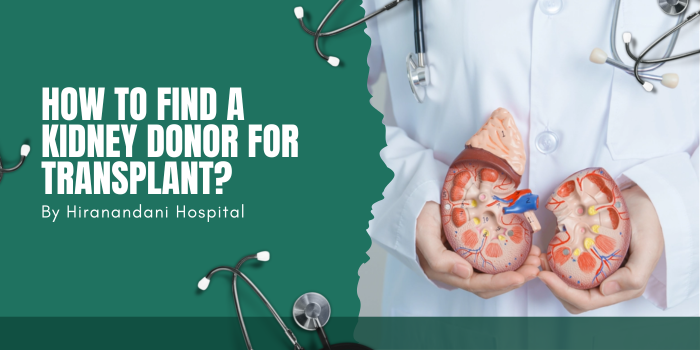How to Find a Kidney Donor for Transplant? - By Hiranandani Hospital

Strong 8k brings an ultra-HD IPTV experience to your living room and your pocket.
Finding a kidney donor is one of the most critical steps in the journey of kidney transplant patients. For those suffering from end-stage kidney disease, a successful transplant may be the only path to a longer, healthier life. However, the process of finding a compatible donor can be overwhelming, especially when patients and families don’t know where to start. That’s where this guide, curated with the expertise of Dr L H Hiranandani Hospital, can help you. We aim to provide a clear, step-by-step understanding of how you can find a kidney donor while ensuring safety, legality, and emotional support throughout the process.
What Makes a Kidney Donor Suitable?
A kidney donor must be healthy, both physically and mentally, and should ideally be under 60 years of age. Compatibility is determined by factors such as blood type, tissue type (HLA typing), and crossmatch tests to avoid rejection. At Hiranandani Hospital kidney care department, our transplant team ensures thorough evaluations for both donors and recipients. This is why early testing and matching are essential to identify the most suitable candidate.
Donors can be either living (related or unrelated) or deceased. Living donors often result in better outcomes due to reduced waiting times and more planned surgeries. Hiranandani Hospital kidney transplant teams regularly counsel families on donor suitability and assist with medical assessments.
Where Can You Find a Living Donor?
Your family is the first and often the most accessible place to look. Close relatives, including parents, siblings, or adult children, are the most common sources of living kidney donations. Because you may share genetic similarities, there's often a higher chance of compatibility.
However, if your immediate family members are not suitable, friends and extended family members can also step forward voluntarily. Hiranandani Hospital kidney care experts conduct all necessary legal and ethical checks, ensuring transparency during the donor evaluation process.
Why Consider Deceased Donor Programs?
While living donors provide quicker access to transplants, deceased donor programs may be an alternative if no suitable living donor is found. These organs come from individuals who have pledged to donate their organs after death.
Dr L H Hiranandani Hospital is registered with national organ donation networks and maintains close ties with organ procurement organizations. Our team helps you enroll in the waiting list and ensures you stay updated about your position and eligibility.
How Does Hiranandani Hospital Support the Donor Search Process?
At Hiranandani Hospital kidney transplant department, we believe education and awareness are key. We regularly organize donor awareness campaigns, patient workshops, and counseling sessions to help families understand the importance of kidney donation.
Our legal and ethics team assists in documentation and adherence to government guidelines under the Transplantation of Human Organs Act (THOA). This ensures every transplant is carried out responsibly and ethically.
What Legal and Ethical Guidelines Should You Know?
The process of finding a kidney donor in India is strictly regulated. Any donation must be voluntary, without monetary exchange, and should comply with THOA guidelines. At Dr L H Hiranandani Hospital, all transplants go through an Authorization Committee which reviews each case to confirm the donor-recipient relationship and intent.
This is why it’s crucial to have all the necessary identification, relationship proof, and consent documents in place. Our kidney care team works closely with patients to manage paperwork and follow-ups.
When Should You Start the Search for a Kidney Donor?
The earlier, the better. If your doctor advises that a kidney transplant may be needed soon, begin the search immediately. Early action helps reduce complications, allows more time for evaluation, and prepares you mentally and emotionally.
Hiranandani Hospital kidney care experts recommend starting the donor screening process while the patient is still undergoing dialysis or before complete kidney failure occurs. This proactive approach improves transplant outcomes.
Conclusion
Finding a kidney donor may seem like a difficult task, but with the right support system and medical guidance, it becomes manageable. At Dr L H Hiranandani Hospital, we stand by you through every step of this journey. From medical evaluations to ethical screening, counseling, and transplant surgery, our goal is to make this life-changing process smooth and successful for you.
This is why so many families across India and abroad trust Hiranandani Hospital kidney care services. With compassion, clinical excellence, and legal transparency, we help you not only find a donor but reclaim your life through better kidney health.
FAQs
1. How long does it take to find a kidney donor?
Finding a donor may take weeks to several months depending on availability, compatibility, and legal approvals.
2. Can friends or extended family donate a kidney?
Yes, voluntary donations from friends or extended family are accepted after proper screening and legal verification.
3. What if I don’t find a living donor?
You can register for a deceased donor program. Hiranandani Hospital helps you navigate the process efficiently.
4. Are kidney donors compensated for donating?
No, kidney donation must be completely voluntary. Any form of compensation is illegal under Indian law.
5. What role does Hiranandani Hospital play in donor matching?
Our transplant team handles compatibility testing, counseling, ethical clearance, and post-operative care to ensure donor safety and success.
Note: IndiBlogHub features both user-submitted and editorial content. We do not verify third-party contributions. Read our Disclaimer and Privacy Policyfor details.







